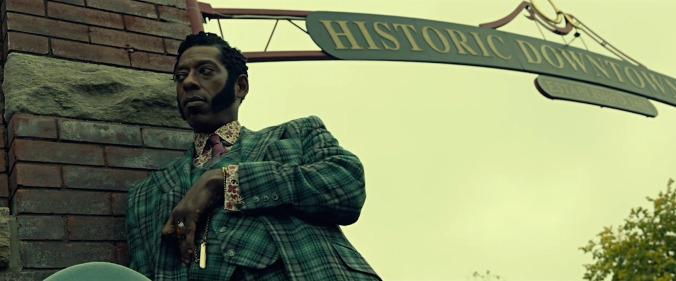In "The Ways Of The Dead," American Gods turns a corner—the wrong corner


“Everything that you said about things getting better was a lie!”
“Do we have a compact?” Odin asks Shadow at the end of “Muninn.” “Do we have a compact?” Mad Sweeney asks Baron Samedi (Mustafa Shakir) at their after-hours dinner at Coq Noir’s chef’s table. “Do we have a compact?” Baron Samedi asks Laura Moon just seconds later.
I want to warn you: “The Ways Of The Dead” opens with, and frequently returns to, a lynching. The long, graphic scene details the real-life lynching of Will “Froggie” James (Warren Belle) by a “murder-hungry throng” who tortured him to death, desecrated his corpse, and cut off his extremities as keepsakes. It’s a true American atrocity, and a naked expression of the white supremacy lurking at the heart of the American narrative.
“Do we have a compact?”
For a television show to successfully navigate incendiary contemporary issues, it must first have a compact with its audience. The audience must trust the show—trust its creators, writers, and directors—to be mindful, to be careful, to be earnest in their storytelling. We must trust them not to sensationalize or exploit, but to explore and expose with honesty and measured purpose.
Reader, I hope you and I can have a compact. I will always be truthful, as truthful as my unconscious limitations allow. If I critique a show for its use of exploitative images, I won’t reproduce those images without good reason. You do not have to worry about seeing the (admittedly affecting and strongly staged) images of Will James’ lynching in this review. But it will be necessary to describe it, and below I will include a picture of Shadow sporting the injuries visited upon him in a vision.
The lynching scene opens the episode, starting as Shadow Moon’s dream. It’s echoed when he wakes to see himself in the bathroom mirror, his chest marred by bullet holes, his head engulfed in flame, as he struggles not to slash his own throat with the straight razor he finds on the edge of the sink. When Shadow asks for explanation—of his vision, and of the identical wounds on the corpse of Jamarr Goodchild (Percy Anane-Dwumfour), the other grandchild of the late Lila Goodchild—Mr. Ibis is happy to oblige.
“Froggie was lynched, shot, beheaded, dragged through the streets, and burned with an audience of ten thousand people who were having the time of their lives. Cairo’s dignity reduced to a pool of blood.” Mr. Ibis’s steady, studied tone of sorrow ushers us through the story, and Demore Barnes gives it every drop of the dignity that swims in his honeyed voice. But we’re presented, for the second (but not last) time and in lavish detail, with the atrocities visited upon Will “Froggie” James. “The Ways Of The Dead” can pay all the lip service it likes to the depravity of Cairo’s racist townsfolk and their bloodlust, but it’s delivering a version of their bloodsport to us, too.
The story of William James (“Will,” Mr. Ibis calls him) deserves attention and atonement. It’s a true horror worthy of—burning for—exposure. Writer (and American Gods season-two co-executive producer) Rodney Barnes and director Salli Richardson-Whitfield (whose resumé ranges from Queen Sugar to Black Dynamite to Chilling Adventures of Sabrina) are more than capable of telling it with incisive perspective and indelible style.
The story of Will James deserves that. What it doesn’t deserve is this lingering voyeurism, the lurid slo-mo brutality of his many injuries, the camera as avid for blood and flame as the mob rioting in Cairo 110 years ago.
“Memento mori,” rasps Will James to Shadow from the ornate mirror in the funeral parlor’s dim bathroom. “Remember that you must die.” But the camera’s grisly, greedy attention to those wounds doesn’t merely remind Shadow, or the audience, of the inevitability of death. It fetishizes the moment of death, and the gratuitous cruelty of this death in particular. (These deaths, because in addition to the terrible, long focus on Will’s terrible, long death, “The Ways Of The Dead” gets the bonus of a white woman’s corpse—Will’s supposed victim, played like Essie MacGowan by Emily Browning—sprawled in a side street to drool over.)
Will James’ curse is visited not, as we might expect, upon the gleeful crowd of white men and women who murdered him. Instead, he haunts Cairo’s young black men, riddling them with bullets and burning them in illusory flame. “What’s missing from someone’s soul that they can do that to another?” Shadow asks Mr. Ibis of Cairo’s mob violence, then without pause moves on to blame Will James: “Why would he curse his own people?”
As it did in “The Greatest Story Ever Told,” American Gods is reducing racial tensions to tensions between black people, not tensions created and intensified by white supremacy and perpetuated by the blithe indifference of those who benefit. “If you are taking brown bodies from this world, you are taking my worshippers,” Mr. Nancy interrupts, slipping again into the accent of his younger days as he accuses Ibis of complicity in the killing of Cairo’s black community. Mr. Ibis’ vague excuses of Froggie’s curse as a symptom of “a simple absence of solutions” don’t excuse the implications of this episode’s choices.
“That which I was has been taken from me,” Will James tells Shadow when they commune. Indeed it has. Though it is not as great an act of violence as Cairo’s mob perpetrated, to repurpose a man’s history—his martyrdom—is a grave responsibility. By repurposing it as as a supernatural version of the specious what about black-on-black crime argument, American Gods shows this is not a responsibility it has earned.
“The Ways Of The Dead” is masterfully acted, well-paced, full of vivid, painfully deployed images and richly detailed sets. If anything, the visuals of the lynching are too striking, too lovingly detailed. It tells a true tale that has long deserved telling. And it’s a disservice both to the history it’s retelling and the audience it’s conning.
I look forward to reading interpretations of “The Ways Of The Dead” from other critics, especially black critics. As The Jinn tells Salim, taking a break from their SIDECAR ADVENTURES to debate the subject of faith, “You’re entitled to your own truth, Salim, but not your own facts.” The facts of Will James’ death are not disputed. The way they’re employed and exploited here? That’s up for dispute. And Rodney Barnes, longtime writer for The Boondocks and Everybody Hates Chris, is no stranger to being misunderstood.
Here is what I am certain of: We do not have a compact, American Gods. Especially after “The Ways Of The Dead,” we do not have a compact. I want to trust your storytelling, but I cannot, because I cannot trust your motives or your methods. I cannot have a compact with a show that I cannot trust on the most volatile, painful questions.
Stray observations
- That’s Glynn Turman as Rev. Hutchins, who is done giving advice to Ruby Goodchild and to all of Cairo.
- “We eat what we want,” Maman Brigitte (Hani Furstenberg) reminds Mad Sweeney, after the most male-gaze-dependent scene I’ve ever reviewed: her thrumming, pumping dance, accompanied by sultry eye contact and backed up by nameless black women mirroring her movements.
- The influence of Bryan Fuller and Michael Green persists in American Gods’ style, but not in its storytelling or execution. The overlapping sex scenes between Laura Moon and Baron Samedi, between Mad Sweeney and Maman Brigitte, and—magically—between Laura Moon and Mad Sweeney conjures memories of a similar Hannibal scene… but without its emotional power or artistic vision.
- I’ve been waiting with some apprehension for the scene, described in the novel, of Laura taking a drink, then disgorging crawling things. This episode’s version is a lot tamer than I expected.